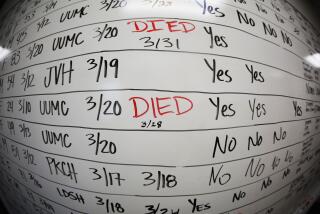AIDS Count Will Increase as Definition Is Broadened
- Share via
ATLANTA — The nation’s AIDS count, now at more than 40,000, will jump noticeably today as federal health officials begin counting thousands of cases that have not been recognized.
The increase comes from a change in the official Centers for Disease Control definition of what AIDS is, in medical terms.
There will be no dramatic announcement that thousands of Americans believed to have suffered from other diseases actually have AIDS. And the disease will not suddenly be found to be attacking groups not previously considered at risk.
Rather, the center will begin listing in its AIDS statistics patients whose physicians may have presumed that they had the deadly disease, but whose cases did not meet the agency’s definition.
As those cases are added into the total, more Americans than ever before will be deemed AIDS patients--and there will be additional AIDS fatalities, which now number more than 23,000.
Federal health officials estimate that the case count could jump by 10%to 15%.
“I expect there will be a jump over the course of a month or two,” said Dr. Tim Dondero, chief of the surveillance and evaluation branch for the center’s AIDS program.
“We know that a number of states have a backlog of cases initially picked up and labeled ‘suspect’ cases, or ‘AIDS-like disease,’ that will now qualify as AIDS under the new definition. How long it takes to report them, we don’t know.”
The goal is to give state and federal health officials a more accurate picture of how widespread AIDS is. Dondero said that since the disease was first reported in 1981, researchers have been careful not to be too quick to pronounce a case as being AIDS.
The new definition, approved by state epidemiologists earlier this year, adds a number of cases that previously were diagnosed only “presumptively”--in a clinic setting, but without laboratory confirmation. Also added will be certain cases of AIDS-related emaciation, tuberculosis infection or dementia.
“What we worry about is being sufficiently specific--not calling things that are not AIDS AIDS,” Dondero said.
More to Read
Sign up for Essential California
The most important California stories and recommendations in your inbox every morning.
You may occasionally receive promotional content from the Los Angeles Times.













